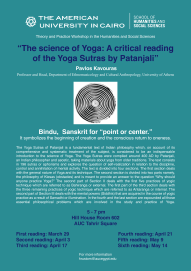| Theme: | |
| Format: | |
| Date: | Apr 3, 2016 7:00–9:00pm |
| Admission: | Public Event |
| Website: | http://calendar.aucegypt.edu/ |
The Science of Yoga: Second Reading
Hill House, Room 602, AUC Tahrir Square
Contact
sape.events@aucegypt.edu
2615.1837
Department
Sociology, Anthropology, Psychology and Egyptology
Pavlos Kavouras professor and head of the Department of Ethnomusicology and Cultural Anthropology at the University of Athens will deliver a lecture titled, "The science of Yoga: A critical reading of the Yoga Sutras by Patanjali."
Bindu, Sanskrit for “point or center", symbolizes the beginning of creation and the conscious return to oneness. The Yoga Sutras of Patanjali is a fundamental text of Indian philosophy which, on account of its comprehensive and systematic treatment of the subject, is considered to be an indispensable introduction to the science of yoga. The Yoga Sutras were compiled around 400 AD by Patanjali, an Indian philosopher and ascetic, drawing on material from older yoga traditions.
The text consists in 196 sutras or aphorisms and explores the question of self-realization in relation to the discipline, control and annihilation of mental activity. The text is divided into four sections. The first section deals with the general nature of yoga and its technique. The second section is divided into two parts namely, the philosophy of Klesas (obstacles) and is meant to provide an answer to the question: Why should anyone practice Yoga? The second part of section two deals with the first five practices of yogic technique which are referred to as Bahiranga or external. The first part of the third section deals with the three remaining practices of yogic technique which are referred to as Antaranga or internal. The second part of section three deals with the mental powers (Siddhis) that are acquired in the course of yogic practice as a result of Samadhi or illumination. The fourth and fianl section are expounds on all those essential philosophical problems which are involved in the study and practice of yoga.









